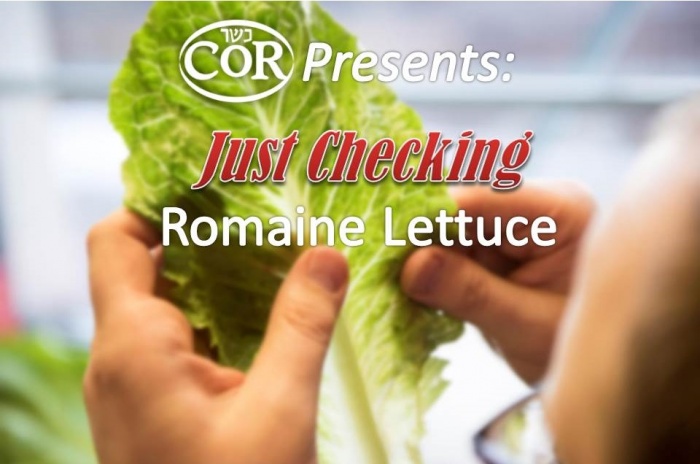Just Checking: Romaine Lettuce from COR Kosher on Vimeo.
With thanks to:
Katan Studios & Sandy Sugar Interiors
Checking Process:
1) Preliminary Check:
Check the produce for the presence of insects; focusing on heavy infestation or infestation of aphids and leaf miners.
· If three or more aphids are found then the produce is not recommended for use.
· If ten or more thrips are found then the produce is not recommended.
2) Prepare Leaves:
Leaves should be separated from the head.
3) Prepare Soap & Water:
Add cold water and sufficient amount of food-grade dish soap or vegetable wash that contains a surfactant in the ingredients to a clean sink or container. The appropriate water to produce ratio is 3:1 (3 parts water to 1 part produce). The proper amount of vegetable wash/soap is when the soap suds are visible in the water.
4) Soaking & Agitating:
Place leaves in water ensuring that the produce is completely submerged in the water. Leaves are thoroughly but gently agitated. Leaves should be agitated in the water for a minimum of one minute.
5) Rinsing:
Leaves should be removed from water and rinsed individually under a strong stream of water; rub the leaves gently while they are rinsed. Care should be taken to ensure that all crevices and folds are opened while rinsing. Rinse both sides of the leaves.
***NOTE: Steps 1-5 can be performed by kitchen help that is not Jewish or a Jewish minor. The following steps should be performed by a Jewish person of the age of mitzvot who is confident in their ability to identify small insects.
Inspection Method for Small Quantities
Inspection:
Check both sides of each and every leaf on a light box for insects. Care must be taken to unfold and open all cracks and crevices. Special focus should be applied to determine the presence of leaf miners.
Kosher Screen Method for Large Quantities
6) Wash:
Fill up a container with fresh water. Place produce inside the container. The appropriate water to produce ratio is 3:1 (3 parts water to 1 part produce). Agitate well and slowly. Remove produce from the container, while shaking out the water from the produce; then place produce in a clean container.
7) Pour Water through Kosher Screen:
Place a clean Kosher Screen in between two colanders and empty the water through the colanders while ensuring that all the water goes into the Kosher Screen. Rinse the container with fresh water and empty the fresh water through the colanders. Let the water flow out completely through the Kosher Screen and into the drain. Shake the top strainer into the Kosher Screen to ensure that any caught insects are now on the Kosher Screen.
8) Check Kosher Screen:
Place the Kosher Screen on a light box. Use a spray bottle to gently spray water on the Kosher Screen. This allows any dirt to spread while allowing clearer visibility of the screen. Examine the Kosher Screen on the light box for the presence of insects. If the screen is free from insects, move on to point 10.
· If one or two insects are found then repeat steps 6-8.
· If three or more thrips or mites are found then this demonstrates that washing was not effective and steps 1-8 should be repeated.
· If three or more aphids, specifically, are found after performing the Kosher Screen Method two times then the Kosher Screen Method should not be repeated and the produce is not recommended for use.
9) Sample Checking:
Twenty-five leaves should be checked on a light box for insects and possible leaf miners. If any insects are found then the rest of the leaves must be checked individually, one by one, both sides of each leaf, on a light box.

